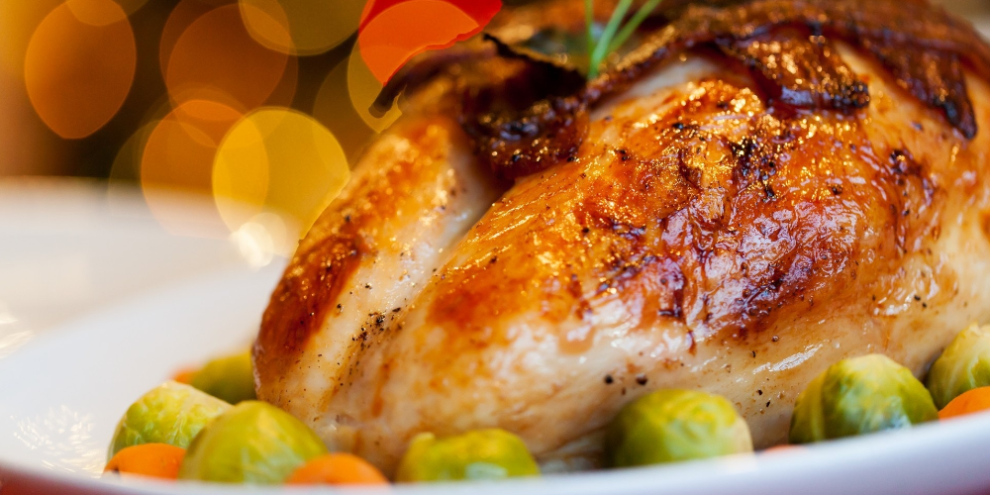
When Canadians soon gather with loved ones for holiday meals, there will be an unwelcome guest at the dinner table: decades−high inflation.
The measure of how much prices have increased shows grocery bills rose by 11 per cent over the last year alone.
"It’s crazy, like you need a mortgage to go to the grocery store right now,” said Danielle Gasner, who runs a Toronto catering business and the Girl Gone Kosher food blog.
Similar observations are being made across the country as holiday fixings, including Christmas turkeys and hams, Kwanzaa celebrators’ jollof rice and collard greens and even the oil the humble Hannukah latke gets fried in, have risen in price.
But many Canadians are ensuring their gatherings don’t leave them ringing in the new year with a big bill. They’re rethinking recipes, scouring for sales, making a shopping list — and checking it twice.
"A lot of Canadians go to the grocery store without a list, without a plan...and that is when you tend to overbuy, overspend, and of course waste food and money," said Kathleen Cassidy, a Toronto−area woman who runs Living on a Loonie, an Instagram account offering money saving advice.
Before heading to a store, she said those aiming to save should calculate how many people they will host and consider their dietary restrictions, so they don’t buy beyond their means.
Then, turn to supermarket flyers in local newspapers or on grocer websites. They reveal sales and which store has the cheapest price.
"Maybe you have turkey every year, but you notice ham or roast beef is on sale," said Cassidy. "You can tweak your traditions or your meal to fit with what is on sale."
In lieu of "crazy"−priced kosher meats like a traditional Hannukah brisket, Gasner said consider dressed−up vegetables.
"Vegetables are cool, so make vegetables your friend and the star," she said.
"Use herbs, olive oil, spices you already have...Putting dill or parsley on top of anything makes it look nice and people want to eat that."
And if you’re struggling with the price of a certain vegetable consider other choices in the same family.
For example, Sunta Sem, a Toronto private chef and caterer who sells meals through the Cookin app, will swap sweet potatoes for other root vegetables like parsnips or when preparing food with greens, opt for Boston lettuce, which she says hasn’t risen in price too much.
Looking at what produce is in season is also handy because seasonal produce is typically cheaper because it doesn’t have to be imported.
"For example, right now, berries are on sale for like $1.80 everywhere compared to a few weeks or a few months ago, when they were $4.99 for a pack of raspberries," said Cassidy.
Pears, brussels sprouts, rutabagas, carrots, beets, cabbage, potatoes, and squash tend to be in season in December, the Dairy Farmers of Ontario’s Milk Calendar says.
Before heading to a store, Sem said to check the fridge or pantry for items you already have and can make use of.
"Always shop your house first," she said. "A lot of people forget things like I’ve bought 70 soy sauces in my life and I’m not sure when that happened."
And once you have a plan, fret not if you don’t have the time or willpower to drive from store-to-store to save.
"If you have a store that price matches, that is always the big kicker," Cassidy said.
"I personally like to shop at Real Canadian Superstore or No Frills because they price match local competitors."
When she visits a store, she keeps an eye out for clearance sections or marked-down items. Sometimes the product’s expiry day is fast approaching, but its lifetime can be stretched by throwing it in the freezer or adding it to a meal made immediately.
Gasner uses that strategy too, stockpiling and freezing berries and tomatoes in summer months for use at the end of the year.
Also, while at the store, Cassidy suggested looking out for coupons. Many brands affix them to store aisles or offer them to newsletter subscribers. Cassidy shares links to coupons on her Instagram page, but sites like RedFlagDeals also compile them.
At the checkout, she recommends using points from loyalty programs, which tend to be free to sign up for.
"A lot of time I see followers who saved their points all year long and use them at the holiday season to help with the purchase obviously of that bigger meal or gifts," she said.
Once you’ve left the store, it’s important to make sure ingredients last until the big day, added Sem.
Place fresh herbs in a glass with water and use plastic to cover its leaves, wrap washed and dried greens in paper towel to keep moisture from ruining them and store meats and dairy in the coldest part of your fridge.
Then, Cassidy said boost your savings one more time by signing up for free apps like Caddle, Checkout 51 and Eclipsa, which ask customers to scan their receipts and in return, offer a few cents or dollars in cash back for the purchase of specific items.
"Over time it can definitely add up and make a difference."
banner image: The Canadian Press





